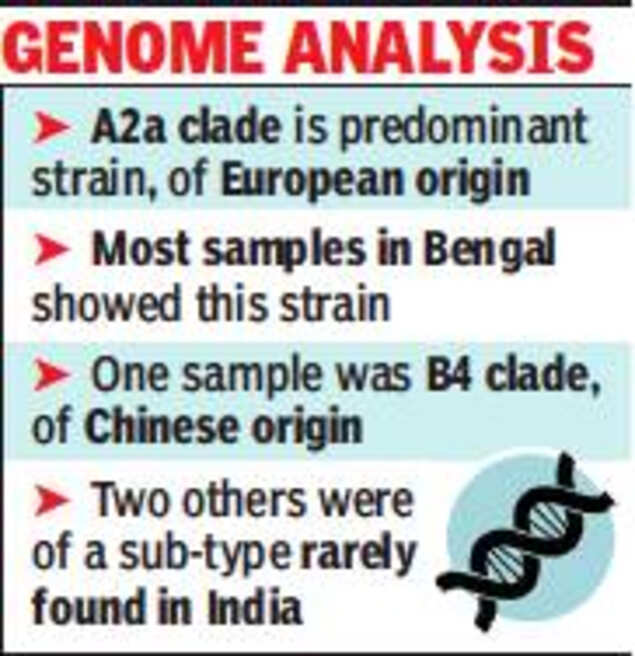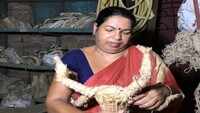
KOLKATA: Most of the earliest nCoV strains found in Bengal were of a mutated subtype found in Europe, according to a preliminary genome analysis. At least one strain was from China, while two others — found in people who hailed from East Midnapore, with no international travel history — were of a subtype rarely found in India.
This fact came to light through a study conducted by National Institute of Biomedical Genomics (NIBMG), Kalyani, NICED and the Bangalore-based Indian Institute of Science. The result has been published in the Journal of Biosciences.

The study was carried out on samples taken from nine patients, but most of the early findings held true against a larger set of data, collected from 1,000 patients, the results of which were released on Saturday.
The preliminary genomic analysis of the earliest nCoV strains — conducted through April and May from samples collected from Bengal patients — indicate that most of those were of the mutated sub-type ‘A2a clade’, found in Europe. Before the study, the Chinese sub-type — B4 clade — was not reported anywhere in India.
Researchers say this had appeared in fewer than 1% of genomic sequences reported worldwide. The 44-year-old man, a Kolkata resident on whose sample it was found, had no travel history to China.
The study found the emergence of several mutations in various genes of the viral genome, that’s expected to be useful for tracking the outbreak.
This fact came to light through a study conducted by National Institute of Biomedical Genomics (NIBMG), Kalyani, NICED and the Bangalore-based Indian Institute of Science. The result has been published in the Journal of Biosciences.

The study was carried out on samples taken from nine patients, but most of the early findings held true against a larger set of data, collected from 1,000 patients, the results of which were released on Saturday.
The preliminary genomic analysis of the earliest nCoV strains — conducted through April and May from samples collected from Bengal patients — indicate that most of those were of the mutated sub-type ‘A2a clade’, found in Europe. Before the study, the Chinese sub-type — B4 clade — was not reported anywhere in India.
Researchers say this had appeared in fewer than 1% of genomic sequences reported worldwide. The 44-year-old man, a Kolkata resident on whose sample it was found, had no travel history to China.
The study found the emergence of several mutations in various genes of the viral genome, that’s expected to be useful for tracking the outbreak.

Coronavirus outbreak
Trending Topics
LATEST VIDEOS
City
 Watch: CM Yogi lights earthen lamps at residence as part of 'deepotsav'
Watch: CM Yogi lights earthen lamps at residence as part of 'deepotsav'  'Wanted to teach Hindus a lesson' using political power, ex-AAP councillor Tahir Hussain confesses
'Wanted to teach Hindus a lesson' using political power, ex-AAP councillor Tahir Hussain confesses  48-hour countdown to Ram Mandir Bhumi Pujan in Ayodhya; invitation cards sent
48-hour countdown to Ram Mandir Bhumi Pujan in Ayodhya; invitation cards sent  UP CM Yogi Adityanath takes stock of preparations in Ayodhya ahead of Ram Temple bhumi pujan ceremony
UP CM Yogi Adityanath takes stock of preparations in Ayodhya ahead of Ram Temple bhumi pujan ceremony
More from TOI
Navbharat Times
Featured Today in Travel
Get the app





